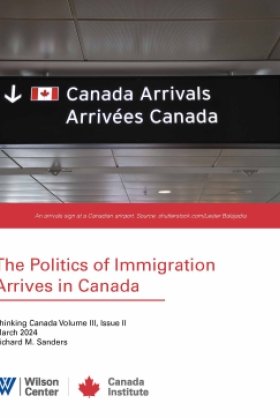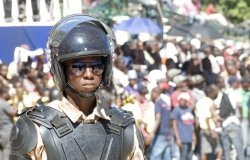Conference – Legal Standards and the Interrogation of Prisoners in the War on Terror
Overview
William H. Taft IV, Fried, Frank, Harris, Shriver & Jacobson and former Legal Advisor, U.S. Department of State; Tom Parker, former counterterrorism official, United Kingdom; Juan Méndez, President, International Center for Transitional Justice; Amrit Singh, Staff attorney, American Civil Liberties Union; Seth Stern, Legal affairs reporter, Congressional Quarterly; David B. Rivkin, Baker Hostetler LLP and former Legal Advisor to the Counsel to the President. Sponsored by the Wilson Center's Division of United States Studies, Latin American Program and Division of International Security Studies.
Sharp differences about both the legality and the utility of coercive investigative techniques used by the United States on prisoners in the war against terror were expressed at a Wilson Center conference on June 6. The conference's first panel focused on the discussion inside the U.S. government about the use of such techniques.
William H. Taft IV, a former legal advisor to the U.S. Department of State as well as a former Deputy Secretary of Defense, cited the International Convention Against Torture and Common Article 3 of the Geneva Conventions, which prohibit the cruel and humiliating treatment of prisoners of war, and said they are binding upon the United States. He noted that the Army Field Manual on Intelligence Interrogation declares extremely coercive techniques to be ineffective. Turning to the question of detainees held in Guantánamo Bay, and the Military Commission Act of 2006 that denies them the right of habeas corpus (the right to be brought before a court), Taft argued that the right to habeas does not apply to the detainees as a matter of constitutional law but should be applied to them as a matter of policy. To do otherwise, he declared, is to raise doubts about whether we have incarcerated the right people and damages American credibility.
David Rivkin, a former legal advisor to the Counsel to the President, however, interpreted Common Article 3 as "capacious," permitting aggressive and humiliating interrogation techniques that stop short of torture. Rivkin argued as well that the Geneva Conventions do not apply to members of al-Qaeda, who are "unlawful enemy combatants." The definition of torture, he added, may be culture-driven and context-driven – as, for example, having a man interrogated by a woman might be considered humiliating in some cultures but not in others. The kind of stress undergone in military action is not cruel in that context but might be considered so in other contexts. Coercive techniques do work, he continued, and have done so throughout history. Rivkin also suggested that extraordinarily rendition – sending prisoners to other countries for interrogation – is legal, assuming the United States receives assurances that torture will not be utilized.
Seth Stern summarized recent congressional action on the issue. The revelations about treatment of prisoners in Abu Ghraib and Guantánamo led to passage of the 2005 Defense Reauthorization Act, which prohibits "cruel, inhuman or degrading" treatment of prisoners. The statute binds the military but not the CIA to the interrogation guidelines in the Army Field Manual. The same year, the Supreme Court found the military tribunals proposed for the Guantánamo prisoners to be illegal because they were not authorized by Congress (Hamdan v. Rumsfeld). At the same time, President George W. Bush acknowledged that the country had kept some prisoners in secret CIA facilities, where they had been subjected to "aggressive" techniques. Senators John McCain, John W. Warner, and Lindsey O. Graham, all with solid defense and military credentials, expressed concern about unilateral executive action. That led to negotiations with the White House and the passage of the Military Commissions Act of 2006, which established military commissions and eliminated habeas corpus for detainees. While the Democrats were outraged at the suspension of habeas, Stern doubted that they will be able to undo the 2006 Act quickly. They do not have the 60 Senate votes necessary to end a filibuster on the issue, and many of the Democrats elected in 2006 are conservative.
Panel II focused on views from outside the U.S. government. Amrit Singh, staff attorney with the American Civil Liberties Union, argued that the debate must take into account information about what has happened on the ground. She therefore presented documents related to the treatment of prisoners in U.S. custody abroad that were obtained by the ACLU under the Freedom of Information Act. These included internal memos and e-mails from both Department of Defense and FBI officials, as well as autopsy reports for prisoners who died in U.S. custody. One FBI document reported on a prisoner who was chained to the floor in a fetal position, in a cell with air conditioning, shivering and close to unconscious. Singh disputed the claim that techniques such as the use of stress positions and constant loud noise, believed to be part of the Survival, Evasion, Resistance, Escape (SERE) training given to U.S. soldiers, were ever intended to be used on captured enemies. She cited an e-mail from the FBI that expressed the FBI's "documented position against some of DOD's interrogation practices" and further indicated that "these tactics have produced no intelligence of a threat neutralizing nature to date."
Juan Méndez, president of the International Center for Transitional Justice and a political prisoner in Argentina in the early 1970s, addressed the question of whether exceptional circumstances allow for permissible derogations of otherwise well-recognized and accepted human rights standards. International human rights law, he indicated, allows states to derogate substantive provisions in times of war or emergency, but does not permit the use of torture. International law clearly mandates that all detainees must have access to independent courts capable of determining fundamental issues such as habeas corpus. Méndez noted that while the Geneva Conventions apply to individuals captured during combat, those seized afterwards fall into a different category. The war on terror therefore involves actions and measures governed by the Geneva Conventions as well as by domestic U.S. law. Méndez criticized the lack of follow-up to ensure that prisoners subject to "extraordinary rendition" are not subsequently tortured in their home country, and said that the U.S. practice of clandestine detention came "very close" to the infamous "disappearances" widespread under Latin American military dictatorships. He called torture "a crime against humanity" when practiced on a systematic basis and said that it was incumbent on the nation's courts to investigate, prosecute and punish acts of torture.
Tom Parker, a former counterterrorism official from the United Kingdom who worked in the field of international terrorism, described himself as an investigator who "likes to put bad guys in jail." Referencing the British experience in Northern Ireland in the early 1970's, Parker asserted that torture was simply not effective. The British "interrogation in depth," which included such practices as hooding, wall standing, stress positions, subjection to noise, and food and water deprivation, was largely a reaction to increased terrorism activity by the Irish Republican Army (IRA). However, in the months following the adoption of these interrogation techniques, murders by the IRA soared from 21 to 147, with a total of 467 killings in 1972. The practices alienated the British from their most important partner, the civilian population of the Irish Republic, and resulted in a judgment against the British by the European Court of Human Rights. Parker stated that "actionable intelligence" is obtainable only within 48 hours of an individual's capture and that holding prisoners for three or four years, as is the case in Guantánamo, has no practical utility. Good interrogators, he said, do not use violence but build rapport with a suspect: the use of torture is a sign of poor intelligence work.
Drafted by Acacia Reed and Adam Stubits
Cynthia Arnson, Latin American Program 202-691-4030
Robert Litwak, Division of International Security Studies 202-691-4179
Philippa Strum, Division of United States Studies 202-691-4149
Hosted By

Latin America Program
The Wilson Center’s prestigious Latin America Program provides non-partisan expertise to a broad community of decision makers in the United States and Latin America on critical policy issues facing the Hemisphere. The Program provides insightful and actionable research for policymakers, private sector leaders, journalists, and public intellectuals in the United States and Latin America. To bridge the gap between scholarship and policy action, it fosters new inquiry, sponsors high-level public and private meetings among multiple stakeholders, and explores policy options to improve outcomes for citizens throughout the Americas. Drawing on the Wilson Center’s strength as the nation’s key non-partisan policy forum, the Program serves as a trusted source of analysis and a vital point of contact between the worlds of scholarship and action. Read more
Thank you for your interest in this event. Please send any feedback or questions to our Events staff.










